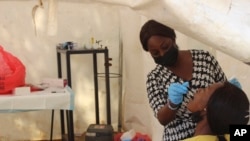Nigeria has confirmed its first cases of the omicron variant of the coronavirus in two travelers from South Africa. But Canada had already reported cases of the variant in Canadians who had recently returned there from Nigeria. The infections raise concerns that the easily spread variant could be taking hold in Nigeria, Africa's most populous country.
Nigeria's Center for Disease Control made the announcement in a statement early Wednesday and said three cases had been confirmed so far.
However, officials corrected the report which had earlier suggested that Nigeria had found evidence of omicron since October in follow-up statement released Wednesday afternoon.
The earlier report raised concerns that the variant may have been circulating for weeks before it was detected and officially announced in South Africa last week.
The variant has spread to least 24 countries.
Nigeria CDC Director General Ifedayo Adetifa says authorities are already taking measures to prevent its spread in Nigeria.
"We are enhancing surveillance in terms of looking at travelers and likely importation of cases and ensuring that travelers adhere to all of the travel advisories. We'll continue to watch as this variant spreads through the population," he expressed.
On Sunday, Canadian authorities said they detected the variant in two travelers, who had recently been in Nigeria and expanded a travel ban to include Nigeria and nine other African countries.
But Nigerian authorities had maintained that no case of the variant had been seen in the country. However, during a weekly COVID-19 update in Abuja Monday, Nigeria's health minister Osagie Ehanire said the country was preparing for any eventualities.
"We are adopting a watchful, waiting posture — watchful waiting posture in that we're looking very closely at all developments and watching the points of entry," he noted.
The World Health Organization has designated omicron a variant of concern and urged leaders to take urgent control measures.
But Adetifa says restricting travel is a step taken too soon. "We are currently the subject of travel bans ourselves for reasons that are not given by the science. This is not driven by the science, and we think from a technical perspective at the moment that this is not the way to go," he pointed out.
Nigerian authorities say they will continue to maintain strong surveillance, hoping to limit the variant's spread and apply stricter measures if need be.




